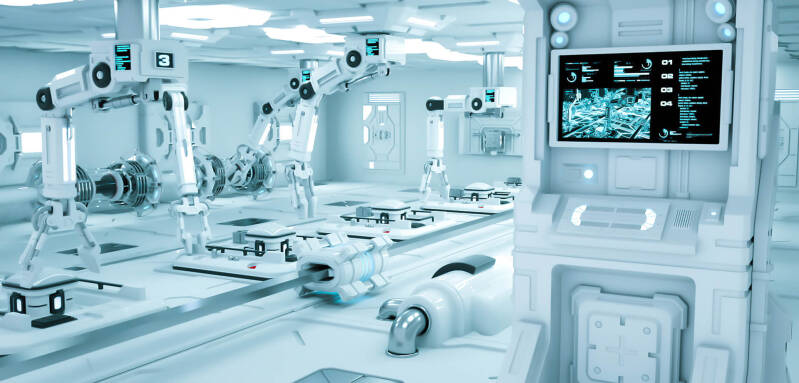INDUSTRIAL AUTOMATION

INDUSTRIAL AUTOMATION
AFFORDABLE! INDUSTRIAL AUTOMATION 2023 : THE FUTURE OF MANUFACTURING
The manufacturing industry has undergone a significant transformation over the years, thanks to the advent of industrial automation. Industrial automation is the use of technology to control and automate manufacturing processes, reducing the need for human intervention. The benefits of industrial automation are numerous, including increased efficiency, improved quality, and reduced costs. In this article, we will explore the world of industrial automation and its impact on the manufacturing industry.
automation is a broad term that encompasses a range of technologies, including robotics, artificial intelligence, and the internet of things (IoT). These technologies work together to create a seamless manufacturing process that is faster, more efficient, and more reliable than ever before. By automating tasks that were previously performed by humans, automation has enabled manufacturers to produce goods at a lower cost and a higher quality.
One of the most significant advantages of industrial automation is increased efficiency. Automation allows manufacturers to produce goods at a faster rate than ever before, reducing lead times and increasing productivity. Machines can work 24/7 without the need for breaks or rest, ensuring that production never stops. This increased efficiency also means that manufacturers can produce goods at a lower cost, making them more competitive in the marketplace.
Another benefit of automation is improved quality. Automation ensures that every product is manufactured to the same standard, reducing the risk of defects and errors. Machines can perform tasks with greater precision than humans, leading to a higher quality end product. This improved quality not only benefits the manufacturer but also the consumer, who receives a better product.
Industrial automation also has a positive impact on the environment. By reducing the need for human intervention, automation reduces the risk of accidents and injuries in the workplace. It also reduces waste and energy consumption, making manufacturing more sustainable and environmentally friendly.
Despite the many benefits of automation, there are some concerns about its impact on the workforce. Automation has the potential to displace workers who perform repetitive or low-skilled tasks. However, it also creates new job opportunities in areas such as robotics and software development. The key is to ensure that workers are trained and reskilled to meet the changing demands of the industry.
In conclusion, automation is the future of manufacturing. It has revolutionized the way goods are produced, making manufacturing faster, more efficient, and more reliable than ever before. While there are concerns about its impact on the workforce, the benefits of automation outweigh the challenges. As the manufacturing industry continues to evolve, automation will play an increasingly important role in shaping its future.
INDUSTRIAL AUTOMATION: REVOLUTIONIZING MANUFACTURING PROCESSES
In today’s fast-paced world, the need for efficient and cost-effective manufacturing processes has become paramount. Automation has emerged as a game-changer in this regard, revolutionizing the way manufacturing processes are carried out. Industrial automation refers to the use of advanced technologies such as robotics, artificial intelligence, and machine learning to automate industrial processes. This article will explore the various aspects of automation and how it is transforming the manufacturing industry.
WHAT IS INDUSTRIAL AUTOMATION?
Industrial automation can be defined as the use of advanced technologies to automate industrial processes. This includes the use of robotics, artificial intelligence, and machine learning to automate various manufacturing processes. Industrial automation has been around for several decades, but recent advancements in technology have made it more accessible and cost-effective.
ADVANTAGES OF INDUSTRIAL AUTOMATION
The use of automation has several advantages, including:
1. Increased Efficiency: Industrial automation can significantly increase the efficiency of manufacturing processes. This is because machines can work faster and more accurately than humans, reducing the time required to complete a task.
2. Improved Quality: Industrial automation can also improve the quality of products. Machines can perform tasks with greater precision, reducing the likelihood of errors.
3. Cost Savings: Industrial automation can reduce labor costs and increase productivity, resulting in cost savings for manufacturers.
4. Increased Safety: Industrial automation can also improve workplace safety by reducing the need for human intervention in hazardous tasks.
TYPES OF INDUSTRIAL AUTOMATION
There are several types of automation, including:
1. Fixed Automation: This type of automation is used for high-volume production of a single product. The machines are designed to perform specific tasks and cannot be reprogrammed for other tasks.
2. Programmable Automation: This type of automation is used for low-volume production of multiple products. The machines can be reprogrammed to perform different tasks.
3. Flexible Automation: This type of automation is used for medium-volume production of multiple products. The machines can be reprogrammed to perform different tasks, and they can also be reconfigured to accommodate different product sizes and shapes.
4. Integrated Automation: This type of automation involves the integration of different types of automation systems to create a seamless manufacturing process.
Challenges of Industrial Automation
Despite its many advantages, automation also presents several challenges. These include:
1. High Initial Costs: The initial investment required to implement automation can be significant, making it difficult for small and medium-sized manufacturers to adopt.
2. Technical Expertise: Automation requires technical expertise, which may not be readily available in some areas.
3. Resistance to Change: Some workers may be resistant to the adoption of automation, fearing that it will lead to job losses.
Conclusion
Industrial automation has emerged as a game-changer in the manufacturing industry, offering several advantages, including increased efficiency, improved quality, cost savings, and increased safety. However, it also presents several challenges, including high initial costs, technical expertise requirements, and resistance to change. As technology continues to advance, it is likely that automation will become even more prevalent in the manufacturing industry, transforming the way products are made.